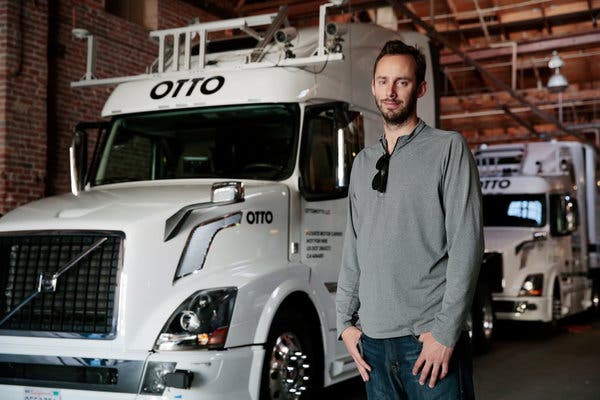SAN JOSE, Calif. — Anthony Levandowski, one of Silicon Valley’s foremost technologists on self-driving cars, was charged by federal prosecutors on Tuesday with 33 counts of theft and attempted theft of trade secrets from Google.
The criminal indictment from the United States Attorney’s Office of the Northern District of California open a new chapter in a legal battle that has embroiled Google, its self-driving car spinoff Waymo and rival Uber in the high-stakes contest over autonomous vehicles. The case also highlights Silicon Valley’s no-holds-barred culture, where gaining an edge in new technologies versus competitors can be paramount.
It is not uncommon for tech companies, which fiercely guard their intellectual property, to sue former employees or the firms they join after they leave. But criminal charges against a senior executive for theft are unusual.
According to the indictment, Mr. Levandowski, who worked on self-driving cars at Google, downloaded more than 14,000 files containing critical information about Google’s autonomous-vehicle research before leaving the company in 2016. He then made an unauthorized transfer of the files to his personal laptop, the indictment said. Mr. Levandowski joined Uber later that year when the ride-hailing firm bought his new self-driving trucking start-up, which was called Otto.
Some of the files that Mr. Levandowski took from Google included private schematics for proprietary circuit boards and designs for light sensor technology, known as Lidar, which are used in self-driving cars, according to the indictment.
“The Bay Area has the best and brightest engineers, and they take big risks,” John Bennett, the F.B.I. special agent in charge of the San Francisco Division, said at a news conference on Tuesday. “But Silicon Valley is not the wild West. The fast-paced and competitive environment does not mean federal laws do not apply.”

The United States attorney’s office said indictment was returned by a federal grand jury on Aug. 15 and unsealed on Tuesday. Mr. Levandowski, 39, turned himself in at the federal courthouse in San Jose, Calif., on Tuesday morning. If convicted, he could face a maximum of 10 years in prison, a $250,000 fine for every count and additional restitution.
“All of us are free to move from job to job,” said David L. Anderson, United States attorney in the Northern District of California. “What we cannot do is stuff our pockets on the way out the door.”
Mr. Levandowski’s lawyers, Miles Erlich and Ismail Ramsey, said in a statement that he didn’t steal anything from anyone.
“This case rehashes claims already discredited in a civil case that settled more than a year and a half ago,” they said. “The downloads at issue occurred while Anthony was still working at Google — when he and his team were authorized to use the information. None of these supposedly secret files ever went to Uber or to any other company.”
Uber said in a statement that the company “has cooperated with the government throughout their investigation and will continue to do so.”
Suzanne Philion, a spokeswoman for Waymo, said the company has “always believed competition should be fueled by innovation, and we appreciate the work of the U.S. Attorney’s Office and the F.B.I. on this case.”
The charges follow a settlement between Waymo and Uber in a trade secrets case. In February 2017, Waymo had accused the ride-hailing firm, Mr. Levandowski and others of stealing self-driving car technology. That case went to trial in San Francisco in February 2018, riveting the tech industry with testimony about the inner workings of technology companies, rivalries among billionaire tech entrepreneurs and the cutthroat competition for engineering talent.
Four days into the trial, Uber and Waymo settled, with Uber agreeing to provide 0.34 percent of its stock to Alphabet, the parent company of Waymo and Google. But Mr. Levandowski’s situation was not resolved by the settlement. The federal judge in the case referred it to the United States Attorney’s Office for a possible criminal inquiry into Mr. Levandowski’s behavior.
Mr. Levandowski was a pioneer in autonomous-vehicle research. He became known for the technology as a graduate student at the University of California, Berkeley, in 2004, when he designed a self-driving motorcycle that was entered in the Pentagon’s first contest for autonomous vehicles.
At Google, which Mr. Levandowski joined last decade, he was a confidant of Larry Page, one of the company’s co-founders. Mr. Levandowski ended up leading many aspects of the self-driving program inside the company’s clandestine “Google X” division. Google’s self-driving car unit was later spun off into Waymo.
In 2016, Mr. Levandowski left Google to form Otto, a self-driving trucking start-up. He took a small army of Google engineers along with him. Otto was quickly acquired by Uber for nearly $700 million. The deal was driven by Travis Kalanick, Uber’s chief executive at the time, who had a vision of building a fleet of self-driving robotaxis that would replace Uber’s hundreds of thousands of human drivers.
In 2017, Waymo sued Uber, Mr. Levandowski and Otto for theft of trade secrets.
“Otto and Uber have taken Waymo’s intellectual property so that they could avoid incurring the risk, time and expense of independently developing their own technology,” Waymo said in its suit.
The relationship between Uber and Mr. Levandowski quickly went south. After invoking his Fifth Amendment right to avoid self-incrimination in the Waymo case, Mr. Levandowski was terminated by Uber in May 2017.
“Uber regrets ever bringing Anthony Levandowski on board,” one of Uber’s lawyers said during the trial last year. “All Uber has to show for Anthony Levandowski is this lawsuit.”
Mr. Levandowski, who made millions of dollars from his work and through sales of his start-ups, has not stepped back. In December, he gave an interview to The Guardian about his new self-driving start-up, Pronto.AI, in which he claimed that he built a car that had driven from San Francisco to New York without human intervention.
Pronto.AI said in a statement on Tuesday that its technology does not rely on Lidar. It added that Robbie Miller, Pronto’s chief safety officer, will take over as its chief executive.







